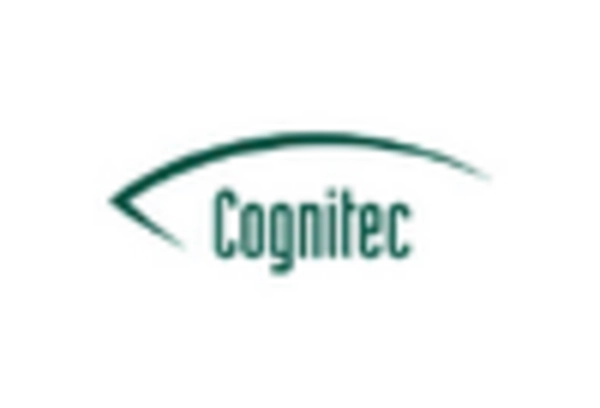Integration with Smart City Projects
The emergence of smart city projects across the GCC is driving the evolution of the facial recognition market. As urban areas become increasingly digitized, the integration of facial recognition technology into city infrastructure is becoming commonplace. This technology is utilized for various applications, including traffic management, public safety, and access control. The market is anticipated to witness a growth rate of around 15% annually as cities invest in smart solutions to enhance livability and security. Moreover, the collaboration between technology providers and municipal authorities is fostering innovation, leading to the development of sophisticated systems that can analyze real-time data. Thus, the facial recognition market is likely to thrive in tandem with the expansion of smart city initiatives.
Government Initiatives and Investments
Government initiatives in the GCC are significantly influencing the facial recognition market. Various national strategies emphasize the adoption of smart technologies to improve public safety and streamline operations. For example, the UAE's Vision 2021 aims to enhance security through innovative technologies, including facial recognition systems. This commitment is reflected in substantial investments, with the market expected to reach approximately $1 billion by 2026. Such initiatives not only foster technological advancements but also encourage collaboration between public and private sectors, leading to the development of tailored solutions that meet regional needs. Consequently, the facial recognition market is poised for robust growth as governments prioritize security and efficiency.
Growing Need for Contactless Solutions
The facial recognition market is benefiting from the increasing demand for contactless solutions in various sectors, particularly in the GCC. As businesses and institutions seek to minimize physical contact, facial recognition technology offers a viable alternative for secure access and identification. This trend is particularly pronounced in sectors such as banking, retail, and healthcare, where customer experience and safety are paramount. The market is projected to grow by approximately 18% over the next five years, driven by the adoption of touchless systems that enhance convenience and security. Consequently, the facial recognition market is likely to see a surge in applications that prioritize user safety while maintaining operational efficiency.
Advancements in AI and Machine Learning
Technological advancements in AI and machine learning are significantly impacting the facial recognition market in the GCC. These innovations enhance the accuracy and efficiency of facial recognition systems, making them more reliable for various applications. The market is expected to grow at a CAGR of around 22% as organizations increasingly adopt AI-driven solutions to improve security and operational processes. Enhanced algorithms enable real-time processing and analysis of facial data, which is crucial for applications in law enforcement, retail, and event management. As AI continues to evolve, the facial recognition market is likely to witness transformative changes, leading to more sophisticated and effective systems.
Rising Demand for Enhanced Security Solutions
The facial recognition market is experiencing a notable surge in demand for advanced security solutions across various sectors in the GCC. Governments and private enterprises are increasingly investing in biometric technologies to bolster security measures. For instance, the market is projected to grow at a CAGR of approximately 20% from 2025 to 2030, driven by the need for effective surveillance systems. This growth is particularly evident in airports, public spaces, and critical infrastructure, where facial recognition technology is being deployed to enhance safety protocols. The integration of AI and machine learning further amplifies the capabilities of these systems, making them more efficient and reliable. As security concerns escalate, the facial recognition market is likely to play a pivotal role in shaping the future of safety and surveillance in the region.















